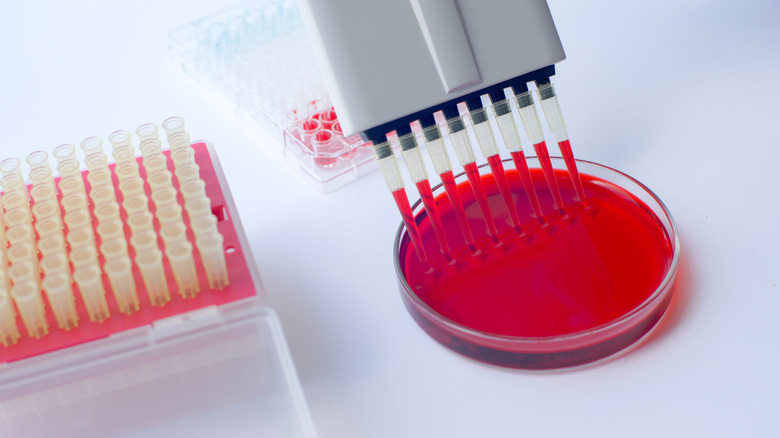What It Means When Your Blood Total Protein Is Low
Proteins are an essential part of the human body. For the body to function properly, protein is needed, and the best way to receive ample amounts is through food, according to Medical News Today. Unfortunately, the body can't store proteins for future use, which is why we need to consume protein daily for the body to function optimally.
The body has two main types of proteins in the bloodstream, known as albumin and globulins (via MedlinePlus). According to the source, albumin prevents blood from leaking out of blood vessels and helps transport vitamins, hormones, and medicine throughout your body. Globulins help transport nutrients as well as aid your body in fighting against infections, per the source. Both are made in the liver, although globulins are also manufactured by the immune system.
Like every other substance, proteins must exist at the right levels. To know whether or not you have normal, low, or high total protein levels, you'll need to undertake a total protein test. According to the University of California San Francisco, the total protein test is fairly simple and only requires a healthcare professional to take a blood sample from a vein in your arm. This is a test that should take no more than five minutes.
According to the Cleveland Clinic, the normal range for total proteins is 6.3 to 8.0 grams per deciliter. For albumin, the normal range is 3.9 to 4.9 grams per deciliter, while globulins have their normal range set at 2.0 to 3.5 grams per deciliter. When your total blood protein is higher than the set range, it is referred to as hyperproteinemia (via Drugs.com). On the other hand, a total blood protein that is lower than the normal range is referred to as hypoproteinemia (via Healthline).
What causes low blood protein levels
When you limit your food intake or follow a highly restrictive diet, you're more likely to experience a shortage of protein in your body, says Medical News Today. There are several causes of diet-related hypoproteinemia, including a person's inability to consume enough calories due to their inadequate income. Also, due to extreme nausea and vomiting, some pregnant women can't consume enough protein, the source states. Another diet-related cause of hypoproteinemia is due to eating disorders such as anorexia nervosa. Lastly, people who engage in highly restricted diets that eliminate nearly all sources of animal-derived ingredients can also experience low protein.
Some people also experience poor absorption of protein from foods. Malabsorption, which is the inability of your body to absorb protein from foods, is a major cause of hypoproteinemia, explains Healthline. Some possible causes of malabsorption include defects in your intestines, parasites and infections, damage to your pancreas, celiac disease, and surgeries that remove a part of your intestines, according to the source.
Kidney issues can also cause hypoproteinemia. The kidney is meant to filter waste products from our blood. When it experiences any damage, it can't fulfill its purpose, which leaves all waste in our bloodstream (via the Cleveland Clinic). In such instances, substances such as protein leak into your urine instead of staying in your blood, as Healthline explains.
Diagnosis and treatment of low blood protein levels
Treatment of hypoproteinemia comes with various options, depending on the cause of your low protein levels, says Healthline. According to the source, you can increase your protein levels by increasing your intake of protein-rich foods like poultry, tofu, red meat, nuts, yogurt, milk, and eggs.
Your doctor might prescribe vitamin and mineral supplements to deal with any nutrient deficiency and a gluten-free diet to treat damaged intestines or celiac disease. Other treatments might include antibiotics and antiparasitic drugs for infections. You might also be prescribed surgery to treat liver damage.
Steroids or immune system suppressors (or any other medication that can bring down inflammation within your intestines) might also be prescribed, per the Cleveland Clinic.
According to Harvard Health Publishing, the recommended daily allowance of protein is 0.8 grams per kilogram or 0.36 grams per pound of your body weight. When checking or counting your daily caloric intake, you need to ensure that at least 10% of your daily calories are from protein, per the source.



